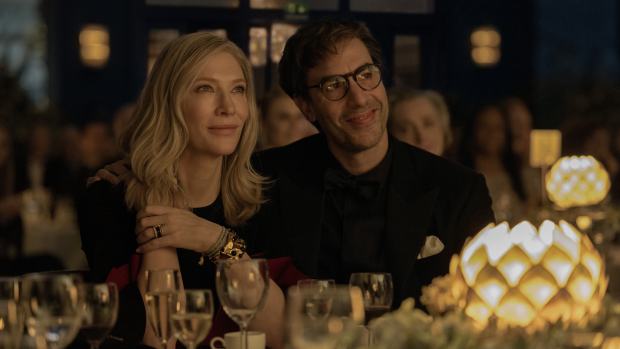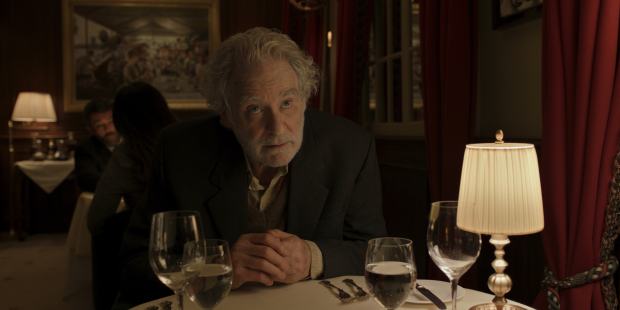A high-class potboiler from Alfonso Cuarón, the psychological thriller “Disclaimer” follows an elegant and respected documentary filmmaker in London, played by Cate Blanchett, whose life is turned upside down and inside out when she’s gifted a self-published novel that is a roman à clef about her. Specifically, a shattering secret she’s kept hidden for the last 20 years. In a panic, she burns the book. But her problems have only just begun.
Adapted by Cuarón from Renée Knight’s 2015 novel of the same name, “Disclaimer” is the story of one woman’s personal catastrophe, as opposed to a catastrophe facing all of humanity as depicted in Cuarón’s 2006 dystopian film “Children of Men,” but the seven-episode series for Apple TV+ might have benefited from more of that movie’s voluble energy. Gorgeously shot (by directors of photography Bruno Delbonnel and Emmanuel Lubezki) and filled with wonderfully sharp-elbowed performances, the series is engrossing right up until it isn’t.
The mysterious book in question comes courtesy of Stephen Brigstocke, a retired school teacher and widower played by Kevin Kline, who is looking to strike revenge on the woman — her name is Catherine Ravenscroft — he believes is morally culpable for the death of his 19-year-old son. That tragedy also occurred 20 years ago and is wrapped up in Catherine’s horrible secret. His goal: To destroy her, and by extension, her family.
And he’s scarily effective, adopting a faux doddering persona in public that belies his clear-eyed focus, carefully pinpointing which people he can use to destroy Catherine. Kline is marvelously droll in these scenes, filled with glee when he walks away from one unsuspecting mark after another, having seeded doubts about this woman’s once-sterling reputation. Stephen’s obsession is dangerous and frankly deranged, the result of long-repressed grief, for both his son and his wife, but also for a life that feels so pointless in hindsight, with his rattling freezer and musty house and no one to share his days with. Only now have these emotions exploded out into the open, propelling him into action. Catherine’s wealth and glossy perfection function as a taunt; watching her unravel is not just a means to an end, but essential to his plan.
Though financially comfortable, Stephen’s world is considerably more downmarket than that of his target. That tension and the class issues undergirding it are overt but unacknowledged by the characters, which is another of Cuarón’s understated choices. But it gets really interesting for a brief moment when we see Catherine’s husband, Robert (Sacha Baron Cohen) at work. He manages his family’s vast investments in a charitable trust that exists “to circumvent anti-money laundering compliance rules.” One charity they fund has been accused of corruption and abuses, and Robert is the kind of guy who instructs his team in vague but pointed terms to make it go away, hopefully with an invented claim of fumbling ignorance: “Worse comes to worst, incompetent is always better than dodgy.” Though a milquetoast figure, in his own elegant and plausibly deniable way, he is just as plotting and destructive and harmful as Steven. But Robert is the one who enables the most harm to the most people, all while remaining above the fray. It’s little more than a footnote in the story, but a searing one at that.
By contrast, Catherine comes from humble beginnings and has transformed herself into someone who seemingly had posher origins. Blanchett is the queen of the unlikeable character who nevertheless draws you in, and she has a real affinity for playing a certain kind of woman — from “Blue Jasmine” to “Notes on a Scandal” to this most recent effort — who has sculpted herself into a person others deem glamorous and impressive, only to see that carefully built façade suddenly crumble, leaving her exposed.
Cuarón has made minor changes to Knight’s novel and nothing wrong there, but one really nagged at me. The book Catherine receives includes a disclaimer at the beginning. In Knight’s version, the page is standard boilerplate language to indicate the following is not based on real events or people — but it has been crossed out with a red pen. Yikes. Cuarón goes in a different direction by changing the wording to read: “Any resemblance to persons living or dead is not a coincidence.” No violent red scratchings needed to get the point across, I suppose. But it’s so much less ominous this way.
It’s a small, almost imperceptible tweak, really. But it suggests a larger overall instinct from Cuarón for something more tasteful than the story probably warrants. On the spectrum that sees the excesses of Ryan Murphy on one end and Cuarón’s refined restraint on the other, the story probably could have used a showrunner with instincts closer somewhere to the middle.

If “Disclaimer” is prestige pulp, Cuarón is more interested in the prestige than the pulp. After expertly turning the screws, the series slackens in the final stretch. A twist is revealed late in the story, resulting in a tidy resolution that is all fizzle, no fizz. The ending also bears little resemblance to how people — especially men — react when given new information about a woman whose credibility they’ve already tossed into the junk heap. Well-made and wonderfully acted, in the end “Disclaimer” is also emotionally dishonest.
“Disclaimer” — 2.5 stars (out of 4)
Where to watch: Apple TV+
Nina Metz is a Tribune critic.



